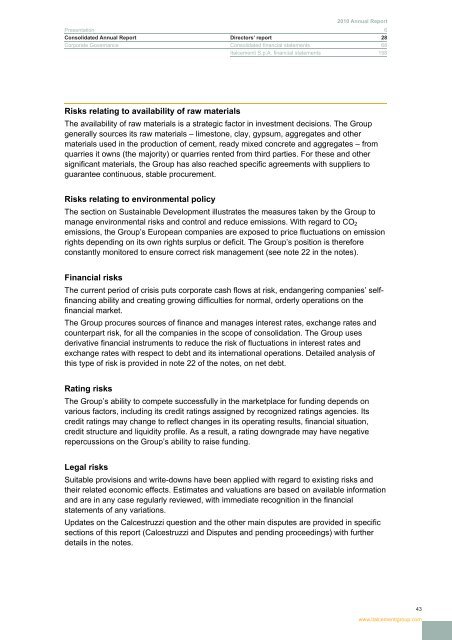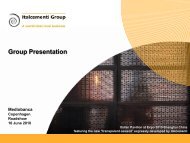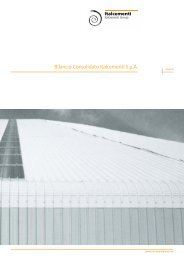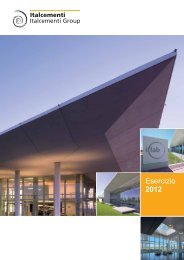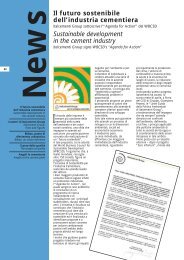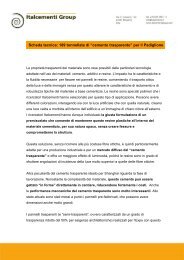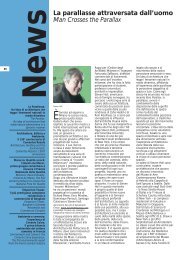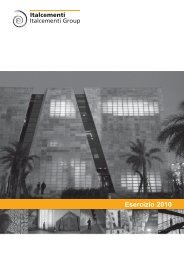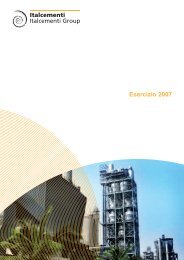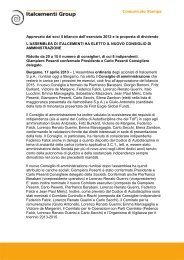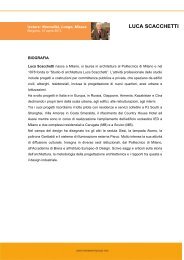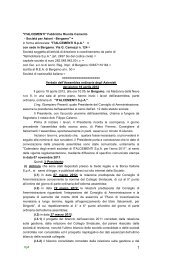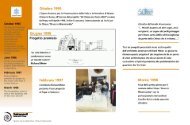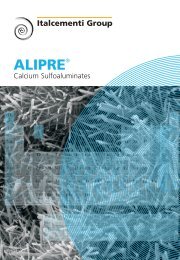Report 2010 - Italcementi Group
Report 2010 - Italcementi Group
Report 2010 - Italcementi Group
Create successful ePaper yourself
Turn your PDF publications into a flip-book with our unique Google optimized e-Paper software.
<strong>2010</strong> Annual <strong>Report</strong><br />
Presentation 6<br />
Consolidated Annual <strong>Report</strong> Directors’ report 28<br />
Corporate Governance Consolidated financial statements 68<br />
<strong>Italcementi</strong> S.p.A. financial statements 158<br />
Risks relating to availability of raw materials<br />
The availability of raw materials is a strategic factor in investment decisions. The <strong>Group</strong><br />
generally sources its raw materials – limestone, clay, gypsum, aggregates and other<br />
materials used in the production of cement, ready mixed concrete and aggregates – from<br />
quarries it owns (the majority) or quarries rented from third parties. For these and other<br />
significant materials, the <strong>Group</strong> has also reached specific agreements with suppliers to<br />
guarantee continuous, stable procurement.<br />
Risks relating to environmental policy<br />
The section on Sustainable Development illustrates the measures taken by the <strong>Group</strong> to<br />
manage environmental risks and control and reduce emissions. With regard to CO 2<br />
emissions, the <strong>Group</strong>’s European companies are exposed to price fluctuations on emission<br />
rights depending on its own rights surplus or deficit. The <strong>Group</strong>’s position is therefore<br />
constantly monitored to ensure correct risk management (see note 22 in the notes).<br />
Financial risks<br />
The current period of crisis puts corporate cash flows at risk, endangering companies’ selffinancing<br />
ability and creating growing difficulties for normal, orderly operations on the<br />
financial market.<br />
The <strong>Group</strong> procures sources of finance and manages interest rates, exchange rates and<br />
counterpart risk, for all the companies in the scope of consolidation. The <strong>Group</strong> uses<br />
derivative financial instruments to reduce the risk of fluctuations in interest rates and<br />
exchange rates with respect to debt and its international operations. Detailed analysis of<br />
this type of risk is provided in note 22 of the notes, on net debt.<br />
Rating risks<br />
The <strong>Group</strong>’s ability to compete successfully in the marketplace for funding depends on<br />
various factors, including its credit ratings assigned by recognized ratings agencies. Its<br />
credit ratings may change to reflect changes in its operating results, financial situation,<br />
credit structure and liquidity profile. As a result, a rating downgrade may have negative<br />
repercussions on the <strong>Group</strong>’s ability to raise funding.<br />
Legal risks<br />
Suitable provisions and write-downs have been applied with regard to existing risks and<br />
their related economic effects. Estimates and valuations are based on available information<br />
and are in any case regularly reviewed, with immediate recognition in the financial<br />
statements of any variations.<br />
Updates on the Calcestruzzi question and the other main disputes are provided in specific<br />
sections of this report (Calcestruzzi and Disputes and pending proceedings) with further<br />
details in the notes.<br />
43<br />
www.italcementigroup.com


